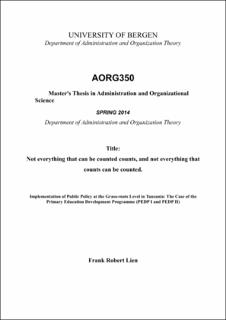| dc.description.abstract | The main purpose of the research was to investigate whether the Primary Education Development Plan (PEDP I and II) had achieved the objective of providing quality education in Tanzania. In order to do this the study aimed to uncover the different stakeholders in the implementation process and their roles and contributions towards success or failure regarding quality improvements. This challenge was explored through document analysis and empirical enquiry. The document analysis and the in-depth interviews and observations on the ground shows that several factors impacts upon implementation of primary school reforms in Tanzania. The policy formulation process, the clarity of policy goals and objectives, inter-organizational coordination, street-level bureaucrats, the target group of the policy, the resources available and the socio-economic conditions were selected as important factors affecting the policy implementation of the PEDP reforms after the literature review.
A qualitative framework applying in-depth semi-structured interviews was selected in order to uncover the experiences of the main implementers and the target group which is affected and influence the implementation of the PEDP policies on the ground in Tanzania. A sample of local stakeholders was purposefully selected in Morogoro district. The aim was to get the personal experiences of stakeholders at different levels.
The empirical data collected points towards two main influences in the policy formulation phase. The first one are the pressure from external influences like donor agencies, and the second one is the Tanzanian governments tendency to make policy decisions by the president and the ministers on top without involving other stakeholders. An example of the latter is the teachers unequivocal statement that they have never been involved, but just told to implement orders from above. As a result of this the same teachers are not sufficiently aware of the reform objectives and do not have adequate ownership of the goals and objectives. The research also found that the resources available for the quality improvements are unrealistic, there is a funding gap and the funding is unpredictable. This makes the full implementation of the reform objectives unlikely and a policy slippage appears. The research. The inter-organizational cooperation at the central level has also complicated the full implementation of the reform.
Moreover, that the majority of the population lives in extreme poverty and pupils and other stakeholders suffers from hunger causes great challenges for learning and management of the school sector. Furthermore, the study uncovers that the PEDP reforms has been managed in a top-down way and not been adapted to different socio-economic circumstances and local culture. Additionally, politics in Tanzania trumps policy and this makes the reforms incoherent.
The research study concludes that important measures of the quality improvements like the `competence based curriculum` and the `child-friendly violence free environment` has not been properly implemented at the two schools in Morogoro region. The results on the dependent variable (pass-rate of the PSLE tests) does show positive results for the two schools implicated for the year of 2013. The results of this research can only give partial explanations and an insight into the reasons for the results on the dependent variable. The recommendations made on the background of the findings is to start with the educational visions and logically go backwards in the implementation process and make a more cohesive and logically connected reform where funds are realistically tied to actual costs for the quality improvements. In order to make this work the implementers on the ground and the local stakeholders should have a seat at the table. Moreover, the quality improvement objectives of the `competence based curriculum` and the `child-friendly violence free environment` needs to be properly operationalized in the policy documents. | |
